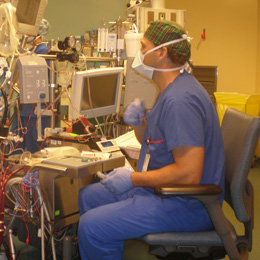 The clinical cardiovascular perfusionist (perfusionist for short) is trained and educated as a member of an open-heart, surgical team responsible for the selection, setup, and operation of a mechanical device commonly referred to as the heart-lung machine. During many types of open-heart and thoracic surgery, the patient's heart is arrested and blood is diverted away from the heart and lungs being pumped and oxygenated by the heart-lung machine. In effect, the machine does the pumping and breathing for the patient.
The clinical cardiovascular perfusionist (perfusionist for short) is trained and educated as a member of an open-heart, surgical team responsible for the selection, setup, and operation of a mechanical device commonly referred to as the heart-lung machine. During many types of open-heart and thoracic surgery, the patient's heart is arrested and blood is diverted away from the heart and lungs being pumped and oxygenated by the heart-lung machine. In effect, the machine does the pumping and breathing for the patient.
The perfusionist is responsible for operating the machine during surgery, monitoring the altered circulatory process closely and taking appropriate corrective action when abnormal situations arise. They're also accountable to the cardiovascular and thoracic surgeon or related physicians.
The role of the perfusionist in providing cardiovascular support has been historically outlined in broad terms, but is continually being redefined as trends in patient care and treatment are updated. The exact duties and responsibilities of a perfusionist are often dependent upon the particular institution where an individual works.
Training and Certification of the Perfusionist
Canada has only three educational programs for the training of perfusionists. They're offered by the Michener Institute for Applied Health Sciences in Toronto; the University of Montreal; and recently the British Columbia Institute of Technology. Candidates accepted into a program have a Bachelors of Science Degree or higher or are practicing registered nurses or respiratory therapists.
Scope of Role
The perfusionist is responsible for the operation and monitoring of those mechanical devices used in medical / surgical procedures requiring partial or complete cardiopulmonary bypass as well as other related support systems. The perfusionist requires specialized knowledge of extracorporeal physiology and mechanics (both adult and pediatric).
Therapeutic Services
In addition to the application of cardiopulmonary bypass for open-heart surgery, a UHN perfusionist currently provides additional therapeutic services which include:
- Administration under prescription, various medical gases, anesthetics, drugs, blood products, and crystalloid solutions
- Induced hypothermia and hemodilution of various degrees
- Operation and monitoring of ventricular assist devices: left ventricular assist devices (LVAD), right ventricular assist devices (RVAD), and intra-aortic balloon pumps (IABP)
- Long term extracorporeal circulatory life support commonly referred to as extracorporeal membrane oxygenation (ECMO)
- Long term interventional lung assist (ILA) commonly referred to as NOVA lung
- XVIVO lung perfusion
- Dialysis and ultrafiltration during extracorporeal support
- Autotransfusion and red blood cell salvage
- Blood component therapy
Technical Services
The perfusionist has developed the skills for all activities related to cardiopulmonary and myocardial perfusion equipment including selection, assembly, calibration, operation, sterilization and routine maintenance. They ensure quality assurance and minor repair of all related equipment, as well as its routine function and performance. They also test and evaluate new equipment for use.
Professional Interaction
The care and support of the patient in the operative and perioperative environments means regular interaction between the perfusionist and a variety of hospital staff and emergency service personnel. The continued care of the patient may involve the collaborative efforts of perfusionists with a variety of emergency service personnel outside the hospital setting.
Patient Assessment
During cardiopulmonary bypass the perfusionist has the responsibility to:
- Analyze various hemodynamic and blood chemistry test results and manipulate the appropriate perfusion equipment or utilize the appropriate perfusion technique according to established guidelines
- Assess the patient in consultation with the physician and provide appropriate intervention to achieve cardiopulmonary and metabolic homeostasis
- Assess procedures to be performed as well as patient requirements and choose appropriate components for the extracorporeal circuit
Careers
UHN is a work place where you will enjoy the unique challenges of your chosen field, create and engage in best practices, and you will be at the heart of facilities bringing the world new health care innovations.
Find out more at
UHN Careers.
